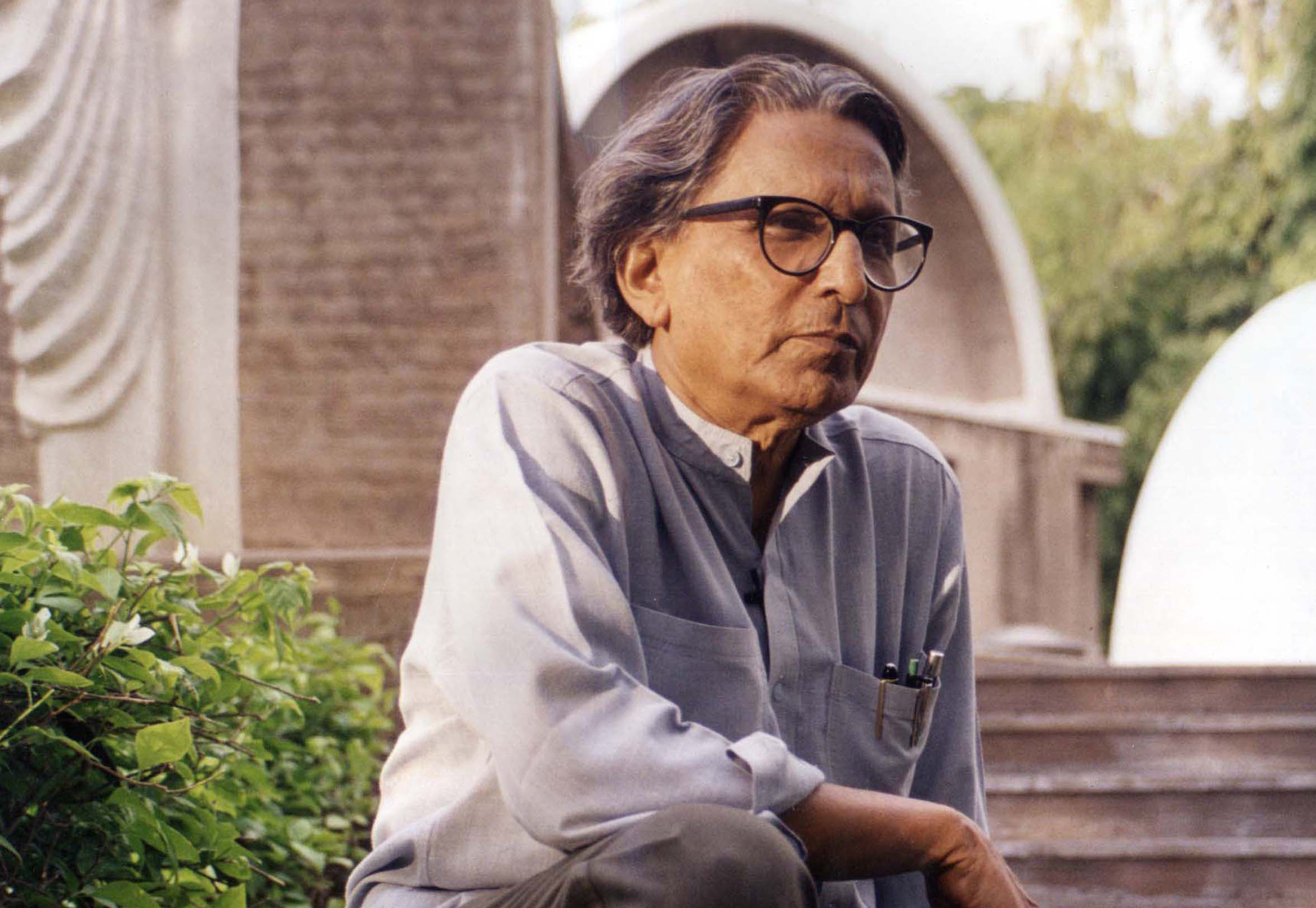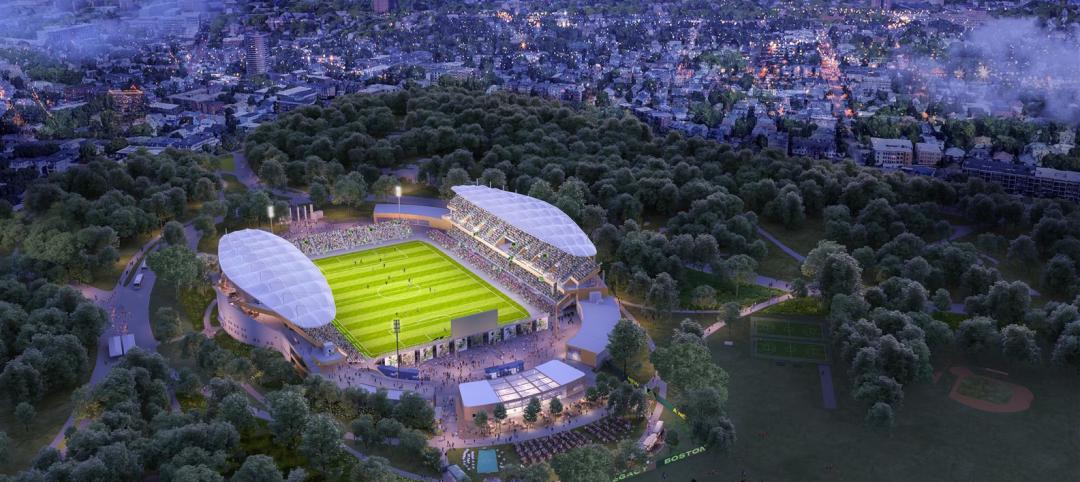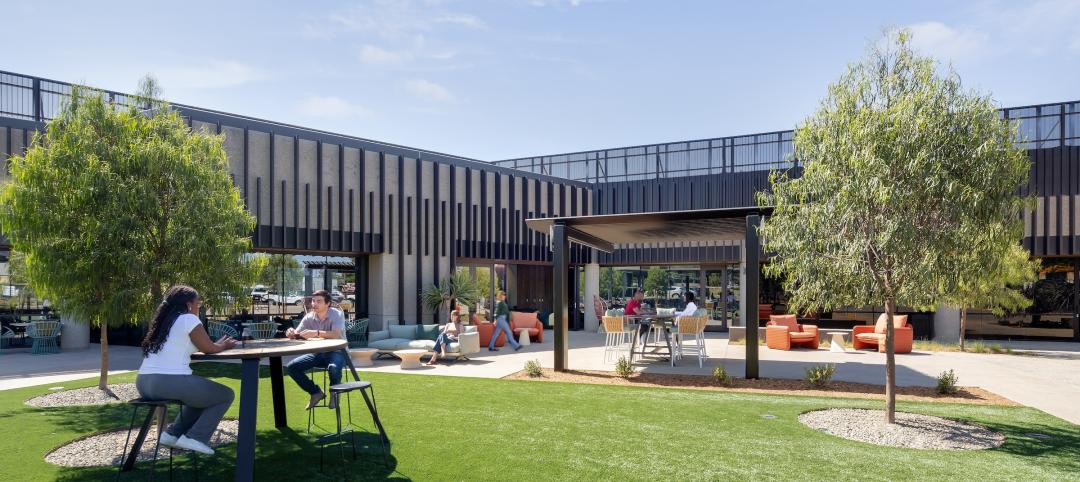Professor Balkrishna Doshi, of India, has been selected as the 2018 Pritzker Architecture Prize Laureate, announced Tom Pritzker, Chairman of Hyatt Foundation, which sponsors the award that is known internationally as architecture’s highest honor.
Architect, urban planner, and educator for the past 70 years, Doshi has been instrumental in shaping the discourse of architecture throughout India and internationally. Influenced by masters of 20th century architecture, Charles-Édouard Jeanneret, known as Le Corbusier, and Louis Khan, Doshi has been able to interpret architecture and transform it into built works that respect eastern culture while enhancing the quality of living in India. His ethical and personal approach to architecture has touched lives of every socio-economic class across a broad spectrum of genres since the 1950s.
“My works are an extension of my life, philosophy and dreams trying to create treasury of the architectural spirit. I owe this prestigious prize to my guru, Le Corbusier. His teachings led me to question identity and compelled me to discover new regionally adopted contemporary expression for a sustainable holistic habitat,” comments Doshi. He continues, “with all my humility and gratefulness I want to thank the Pritzker Jury for this deeply touching and rewarding recognition of my work. This reaffirms my belief that, ‘life celebrates when lifestyle and architecture fuse.’”
Doshi’s architecture explores the relationships between fundamental needs of human life, connectivity to self and culture, and understanding of social traditions, within the context of a place and its environment, and through a response to Modernism. Childhood recollections, from the rhythms of the weather to the ringing of temple bells, inform his designs. He describes architecture as an extension of the body, and his ability to attentively address function while regarding climate, landscape, and urbanization is demonstrated through his choice of materials, overlapping spaces, and utilization of natural and harmonizing elements.
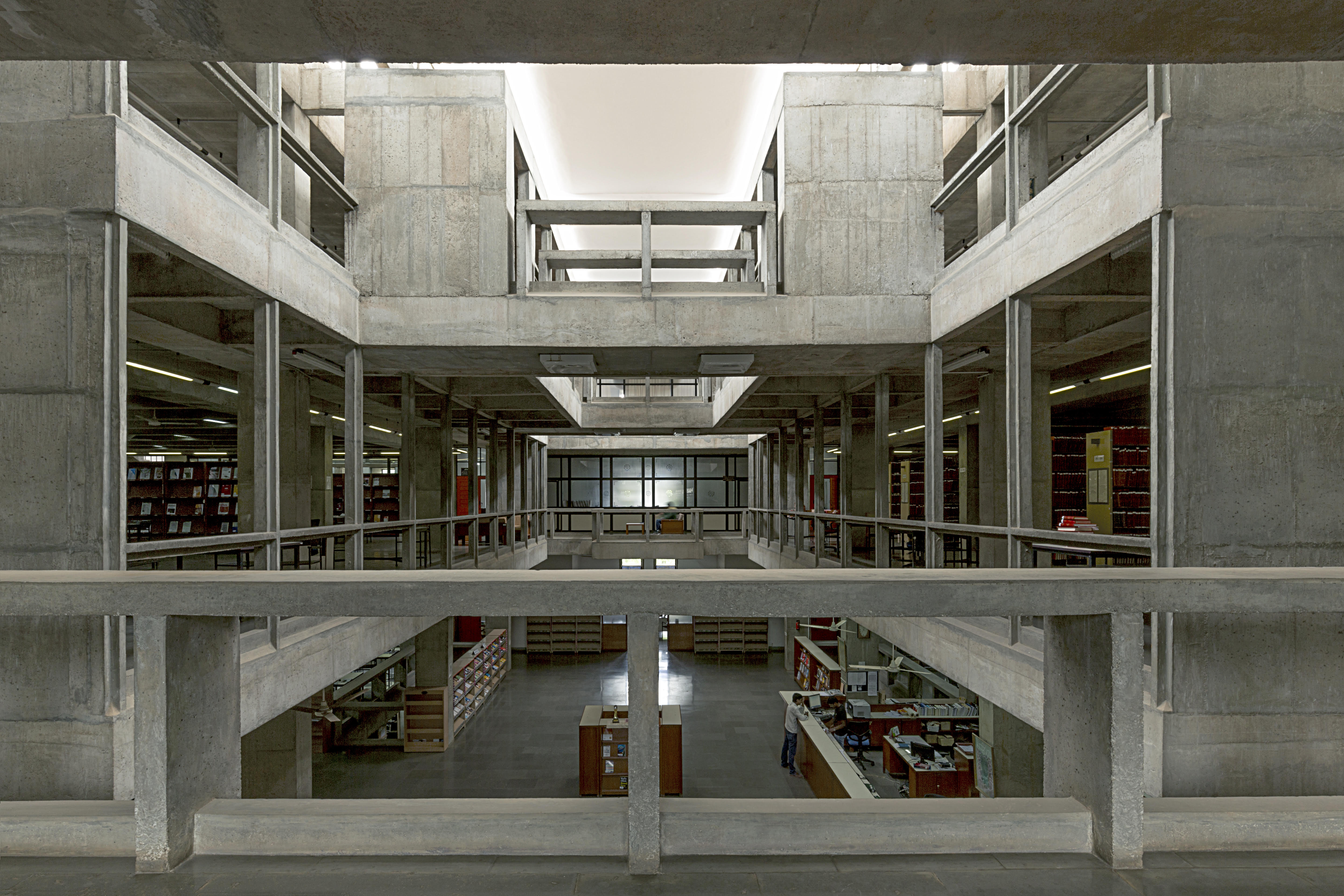 Indian Institute of Management, Bangalore (photo courtesy of VSF)
Indian Institute of Management, Bangalore (photo courtesy of VSF)
“Professor Doshi has said that ‘Design converts shelters into homes, housing into communities, and cities into magnets of opportunities,” comments Mr. Pritzker. “The life’s work of Balkrishna Doshi truly underscores the mission of the Prize—demonstrating the art of architecture and an invaluable service to humanity. I am honored to present the 40th anniversary of this award to an architect who has contributed more than 60 years of service to us all.”
The architect designed Aranya Low Cost Housing (Indore, 1989), which presently accommodates over 80,000 individuals through a system of houses, courtyards and a labyrinth of internal pathways. Over 6,500 residences range from modest one-room units to spacious homes, accommodating low and middle-income residents. Overlapping layers and transitional areas encourage fluid and adaptable living conditions, customary in Indian society.
Doshi´s architecture is both poetic and functional. The Indian Institute of Management (Bangalore, 1977-1992), inspired by traditional maze-like Indian cities and temples, is organized as interlocking buildings, courts and galleries. It also provides a variety of spaces protected from the hot climate. The scale of masonry and vast corridors infused with a campus of greenery allow visitors to be simultaneously indoors and outdoors. As people pass through the buildings and spaces, Doshi invites them to experience their surroundings and also suggests the possibility of transformation.
The 2018 Jury Citation states, in part: “Over the years, Balkrishna Doshi has always created an architecture that is serious, never flashy or a follower of trends. With a deep sense of responsibility and a desire to contribute to his country and its people through high quality, authentic architecture, he has created projects for public administrations and utilities, educational and cultural institutions, and residences for private clients, among others.” The Jury continues, “Doshi is acutely aware of the context in which his buildings are located. His solutions take into account the social, environmental and economic dimensions, and therefore his architecture is totally engaged with sustainability.”
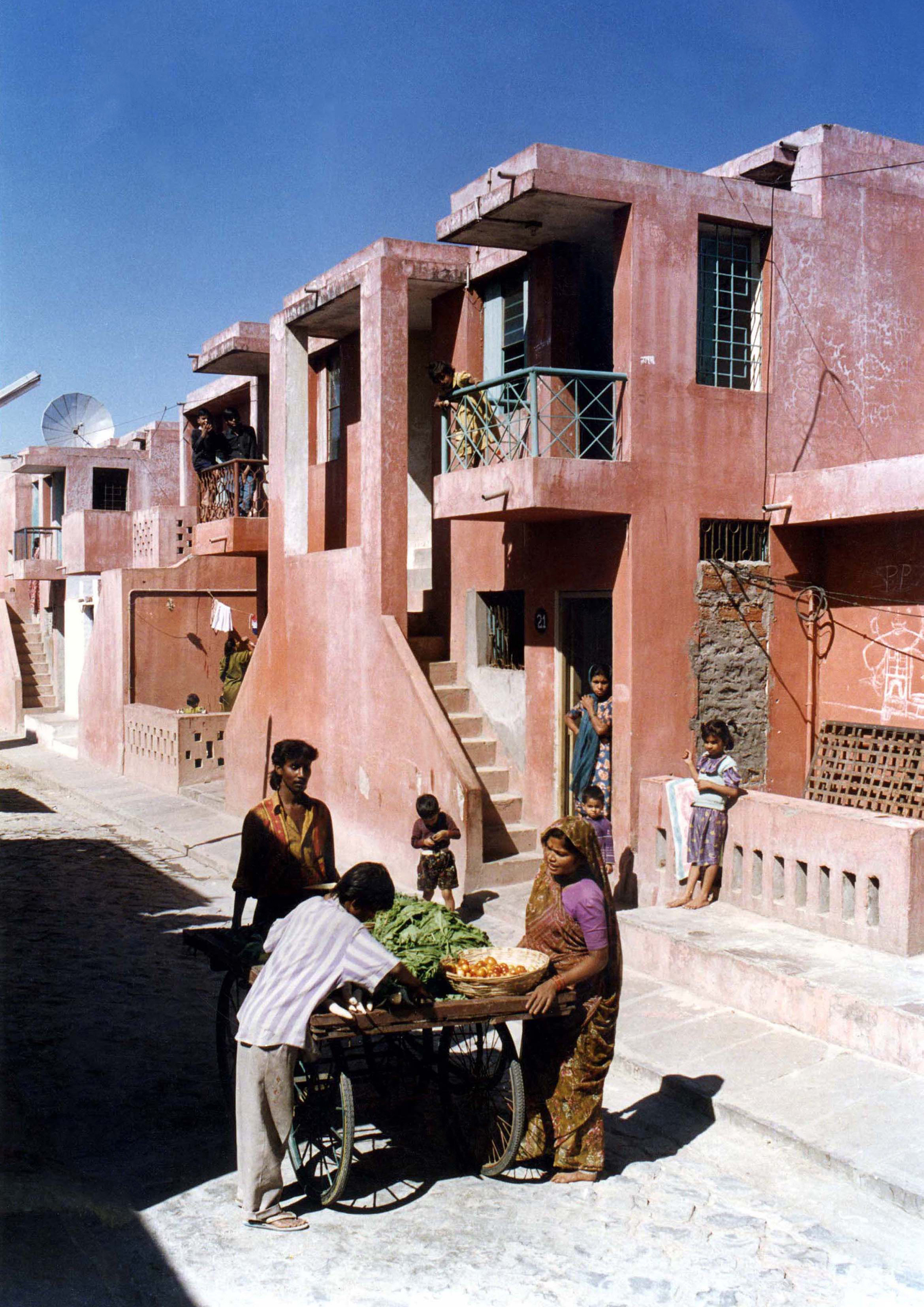 Aranya Low Cost Housing (photo courtesy of VSF)
Aranya Low Cost Housing (photo courtesy of VSF)
His studio, Sangath (Ahmedabad, 1980), translates to “moving together.” The placement of communal spaces, including a garden and outdoor amphitheater, highlights Doshi’s regard for collaboration and social responsibility. Vaulted roofs, porcelain mosaic tile coverings, grassy areas, and sunken spaces mitigate extreme heat. The mosaic tile detail is echoed in the tortoise-shell inspired roof of Amdavad Ni Gufa (Ahmedabad, 1994), an undulating, cave-like, ferro-cement art gallery, positioned underground, featuring works of Maqbool Fida Husain.
Other notable works include academic institution Centre for Environmental Planning and Technology (CEPT University) (Ahmedabad, 1966-2012); cultural spaces such as Tagore Memorial Hall (Ahmedabad, 1967), the Institute of Indology (Ahmedabad, 1962), and Premabhai Hall (Ahmedabad, 1976); housing complexes Vidhyadhar Nagar Masterplan and Urban Design (Jaipur, 1984) and Life Insurance Corporation Housing or “Bima Nagar” (Ahmedabad, 1973); and private residence Kamala House (Ahmedabad, 1963), among many others.
“Every object around us, and nature itself—lights, sky, water and storm—everything is in a symphony,” explains Doshi. “And this symphony is what architecture is all about. My work is the story of my life, continuously evolving, changing and searching…searching to take away the role of architecture, and look only at life.”
Doshi is the 45th Pritzker Prize Laureate, and the first to hail from India. The 2018 Pritzker Architecture Prize ceremony commemorates the 40th anniversary of the accolade, and will take place at the Aga Khan Museum in Toronto, Canada, this May. The Laureate will present a public lecture, in partnership with the John H. Daniels Faculty of Architecture, Landscape, and Design at the University of Toronto on May 16, 2018.
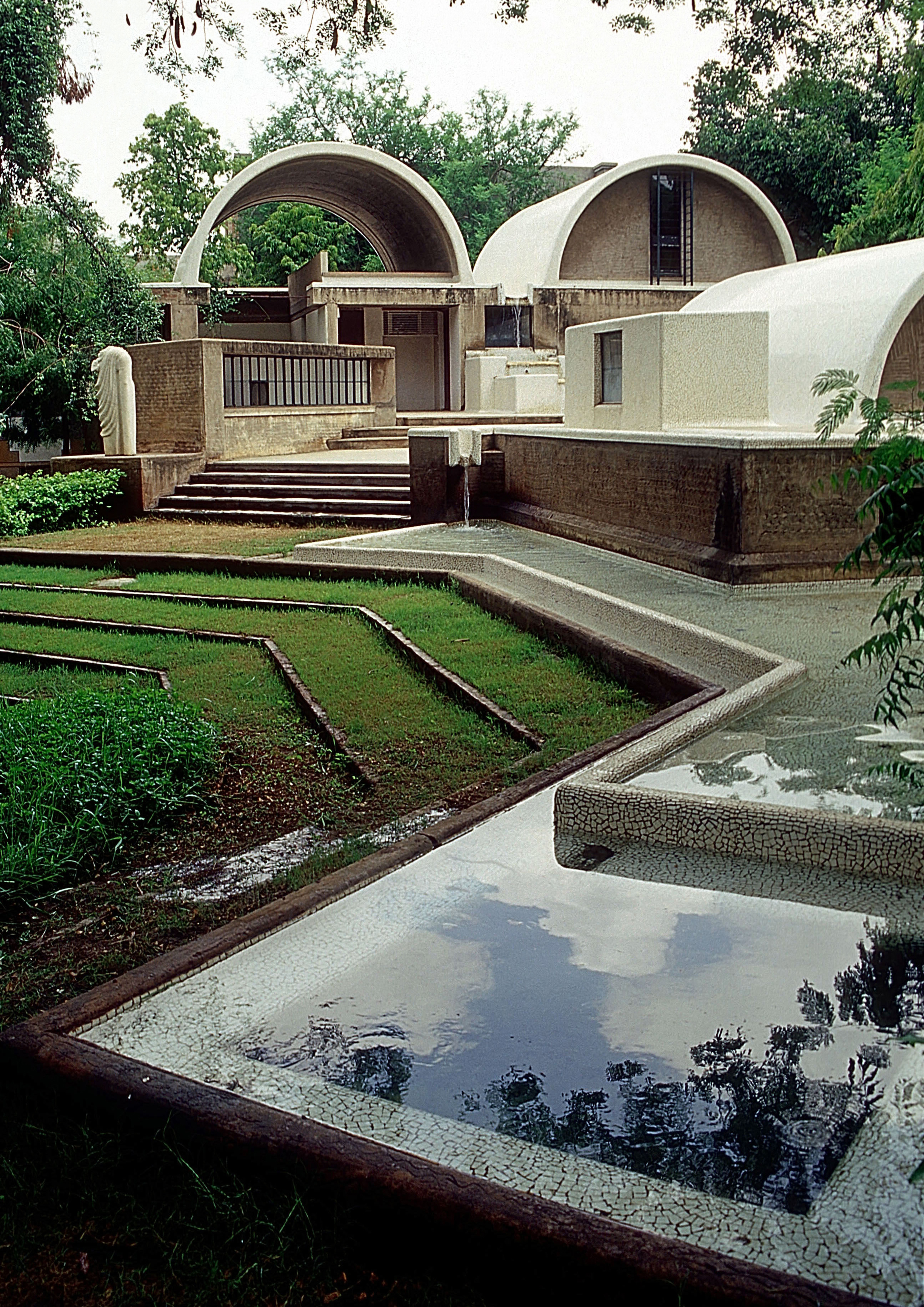 Sangath Architect's Studio (photo courtesy of VSF)
Sangath Architect's Studio (photo courtesy of VSF)
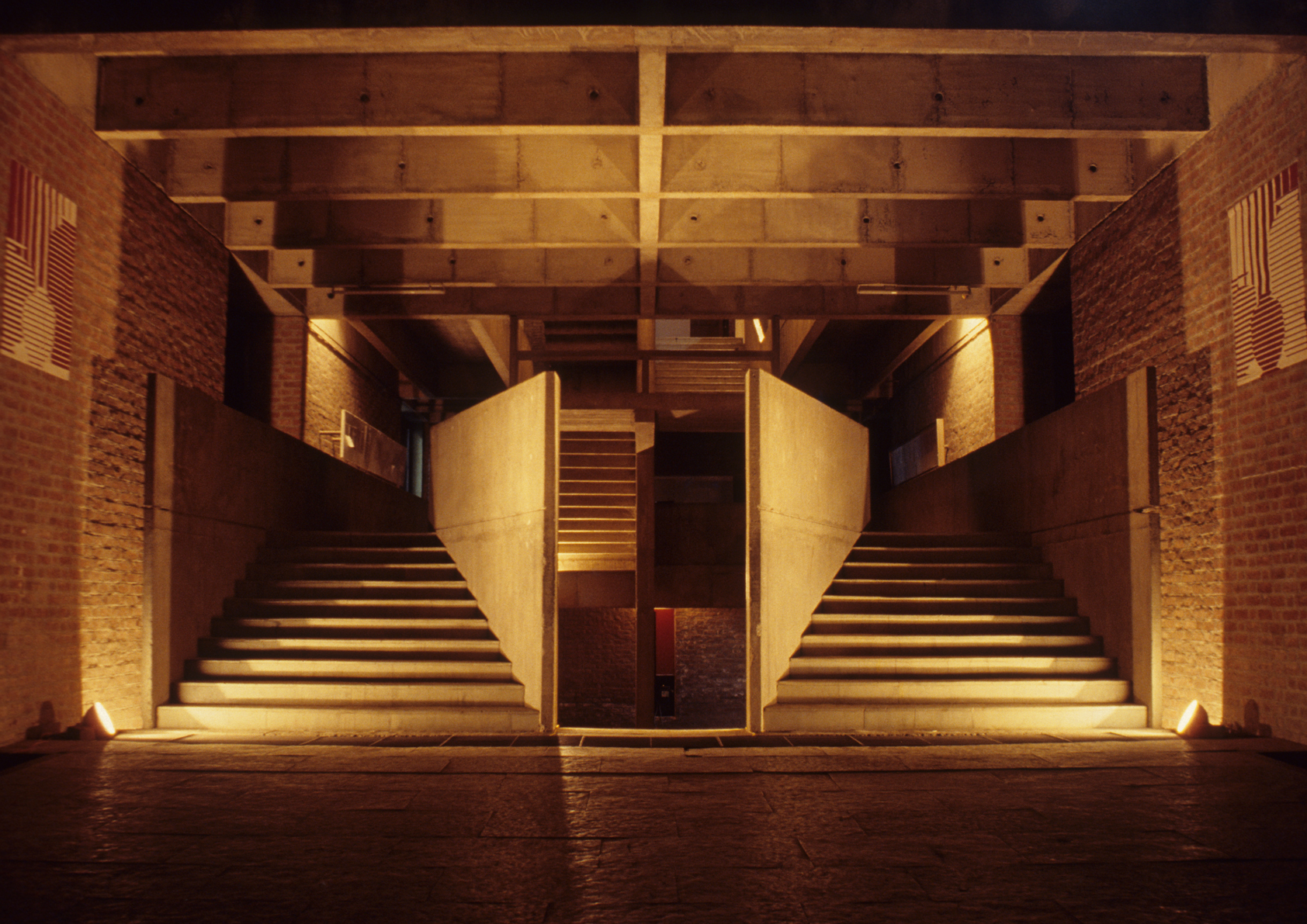 Centre for Environmental Planning and Technology (photo courtesy of VSF)
Centre for Environmental Planning and Technology (photo courtesy of VSF)
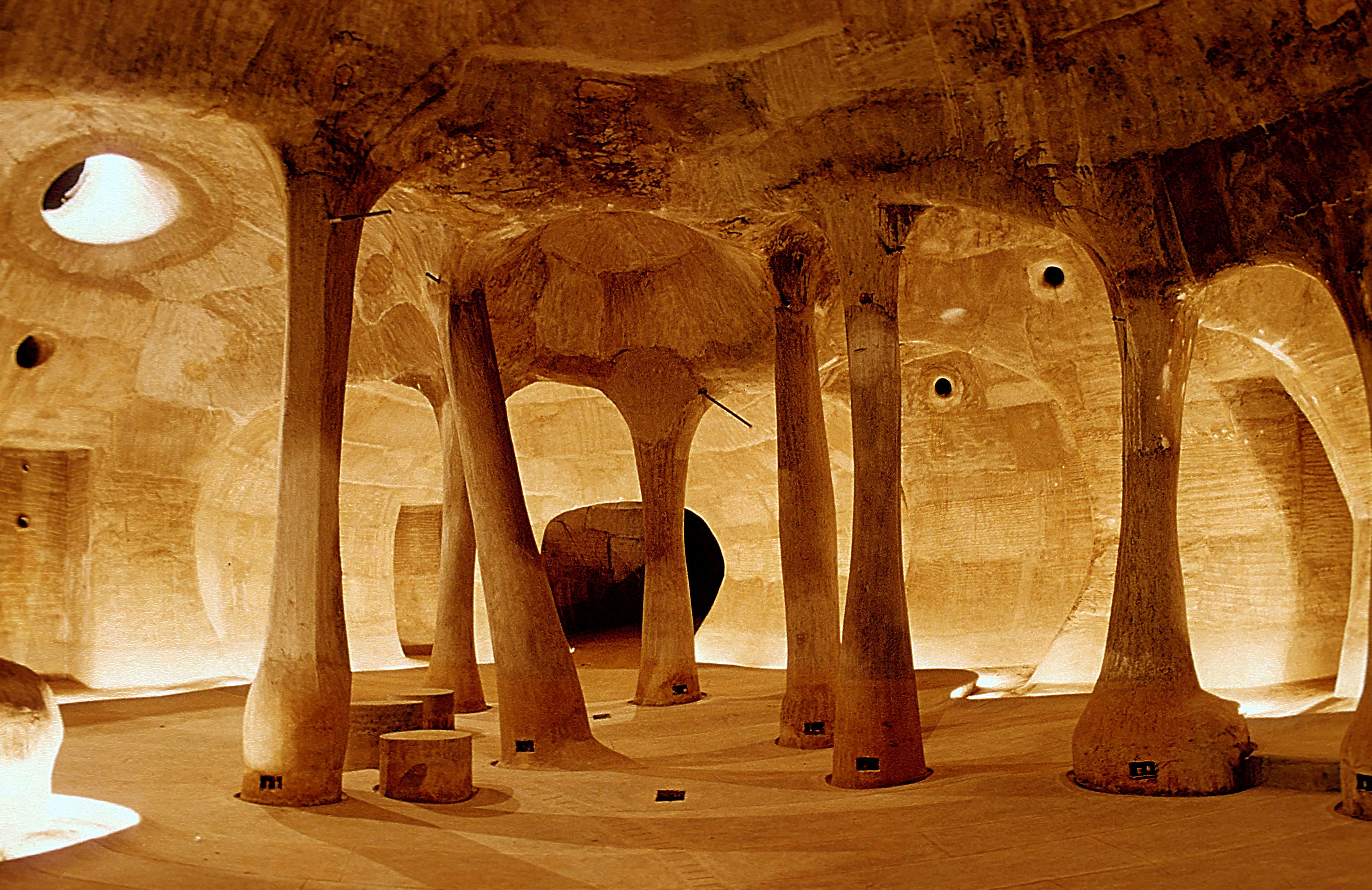 Amdavad Ni Gufa (photo courtesy of VSF)
Amdavad Ni Gufa (photo courtesy of VSF)
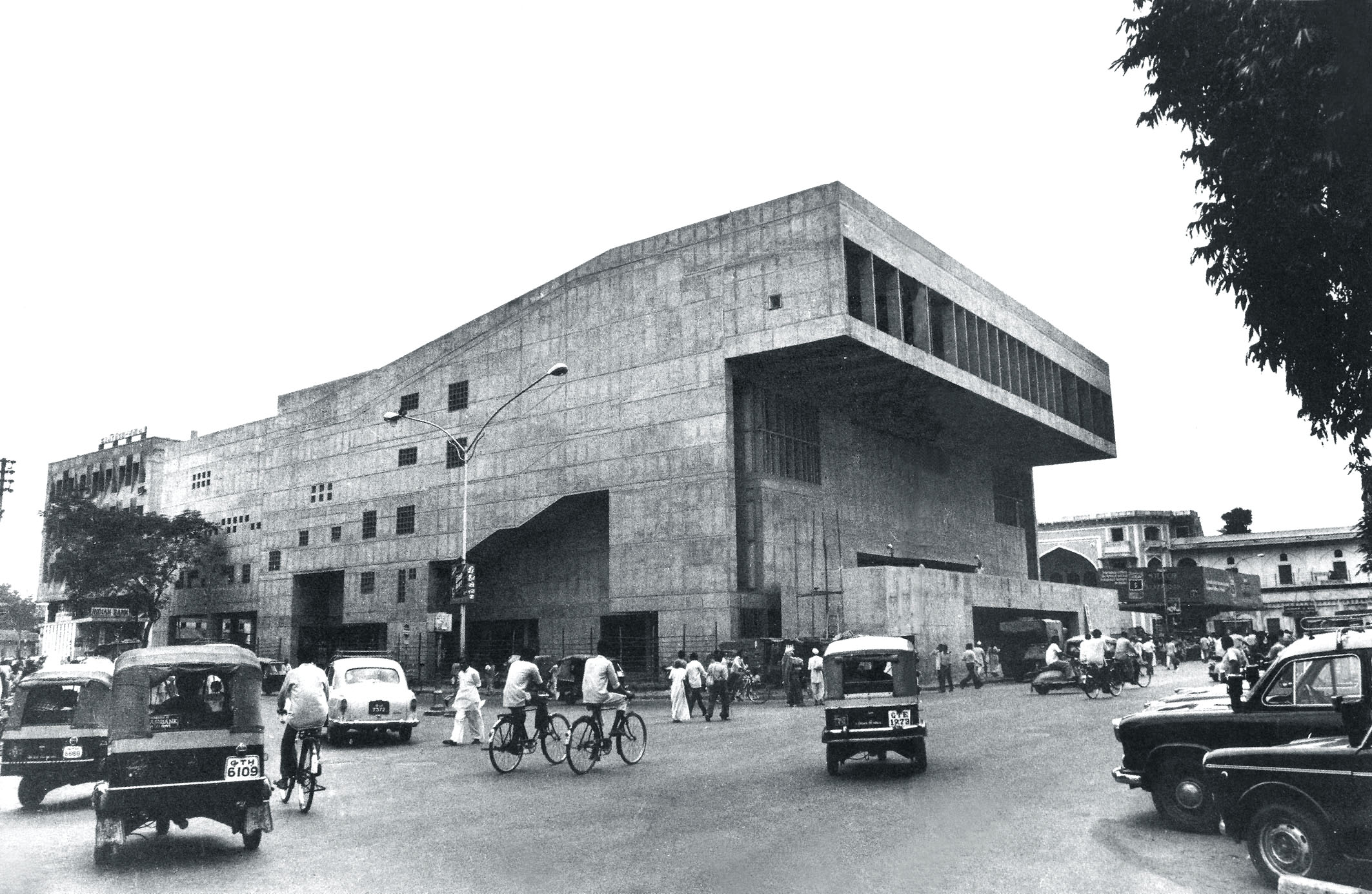 Premabhai Hall (photo courtesy of VSF)
Premabhai Hall (photo courtesy of VSF)
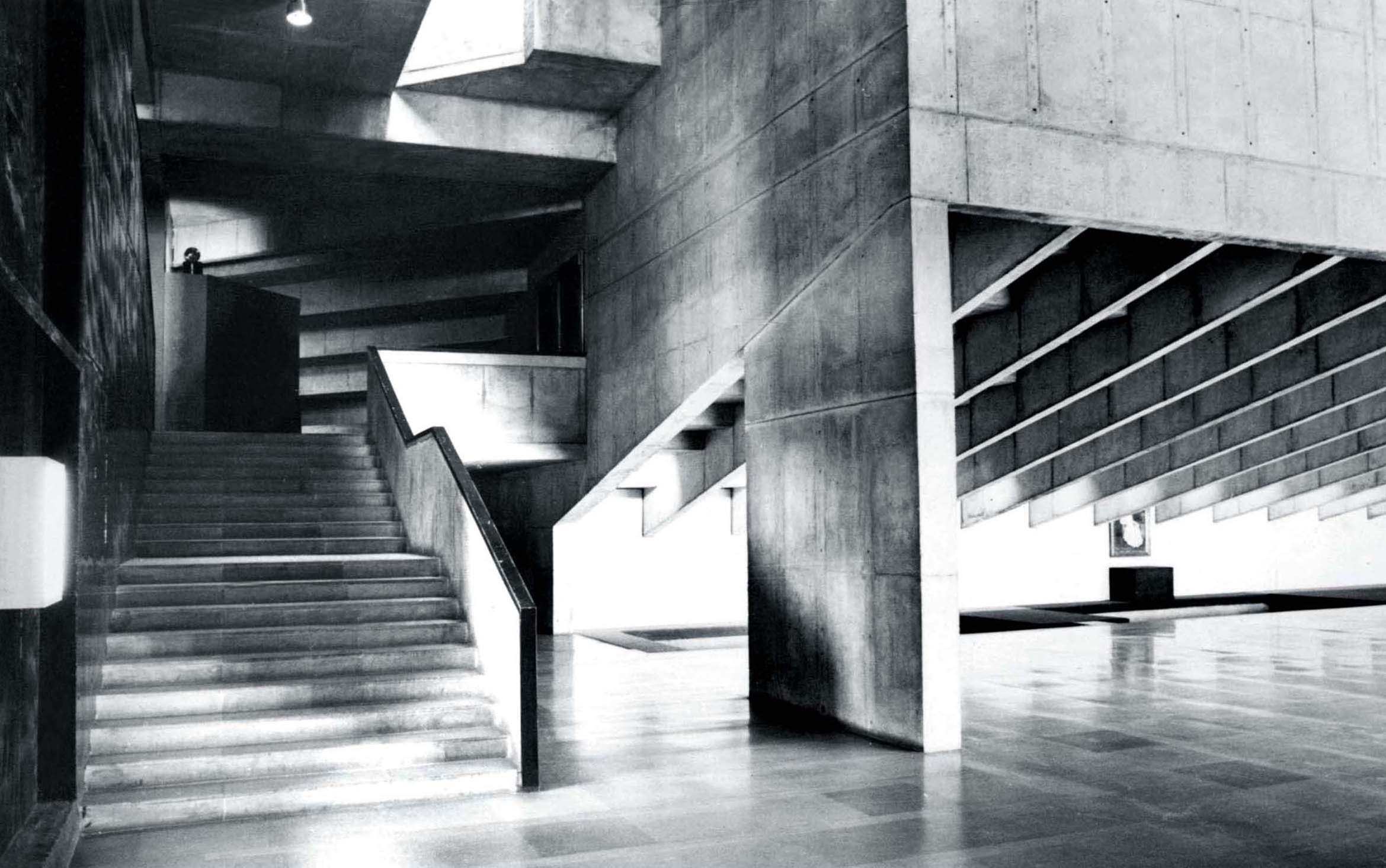 Premabhai Hall (photo courtesy of VSF)
Premabhai Hall (photo courtesy of VSF)
Related Stories
MFPRO+ New Projects | Oct 30, 2024
BIG’s One High Line finally reaches completion in New York City’s West Chelsea neighborhood
One High Line, a luxury residential project spanning a full city block in New York’s West Chelsea neighborhood, reached completion this summer following years of delays related to investor lawsuits.
Urban Planning | Oct 30, 2024
Bridging the gap: How early architect involvement can revolutionize a city’s capital improvement plans
Capital Improvement Plans (CIPs) typically span three to five years and outline future city projects and their costs. While they set the stage, the design and construction of these projects often extend beyond the CIP window, leading to a disconnect between the initial budget and evolving project scope. This can result in financial shortfalls, forcing cities to cut back on critical project features.
MFPRO+ New Projects | Oct 30, 2024
Luxury waterfront tower in Brooklyn features East River and Manhattan skyline views
Leasing recently began for The Dupont, a 41-story luxury rental property along the Brooklyn, N.Y., waterfront. Located within the 22-acre Greenpoint Landing, where it overlooks the newly constructed Newtown Barge Park, the high-rise features East River and Manhattan skyline views along with 20,000 sf of indoor and outdoor communal space.
Libraries | Oct 30, 2024
Reasons to reinvent the Midcentury academic library
DLR Group's Interior Design Leader Gretchen Holy, Assoc. IIDA, shares the idea that a designer's responsibility to embrace a library’s history, respect its past, and create an environment that will serve student populations for the next 100 years.
Resiliency | Oct 29, 2024
Climate change degrades buildings slowly but steadily
While natural disasters such as hurricanes and wildfires can destroy buildings in minutes, other factors exacerbated by climate change degrade buildings more slowly but still cause costly damage.
Office Buildings | Oct 29, 2024
Editorial call for Office Building project case studies
BD+C editors are looking to feature a roundup of office building projects for 2024, including office-to-residential conversions. Deadline for submission: December 6, 2024.
Healthcare Facilities | Oct 28, 2024
New surgical tower is largest addition to UNC Health campus in Chapel Hill
Construction on UNC Health’s North Carolina Surgical Hospital, the largest addition to the Chapel Hill campus since it was built in 1952, was recently completed. The seven-story, 375,000-sf structure houses 26 operating rooms, four of which are hybrid size to accommodate additional equipment and technology for newly developed procedures.
Multifamily Housing | Oct 28, 2024
A case for mid-rise: How multifamily housing can reshape our cities
Often referred to as “five-over-ones,” the mid-rise apartment type is typically comprised of five stories of apartments on top of a concrete “podium” of ground-floor retail. The main criticism of the “five-over-one” is that they are often too predictable.
Sports and Recreational Facilities | Oct 24, 2024
Stadium renovation plans unveiled for Boston’s National Women’s Soccer League
A city-owned 75-year-old stadium in Boston’s historic Franklin Park will be renovated for a new National Women’s Soccer League team. The park, designed by Fredrick Law Olmsted in the 1880s, is the home of White Stadium, which was built in 1949 and has since fallen into disrepair.
Laboratories | Oct 23, 2024
From sterile to stimulating: The rise of community-centric life sciences campuses
To distinguish their life sciences campuses, developers are partnering with architectural and design firms to reimagine life sciences facilities as vibrant, welcoming destinations. By emphasizing four key elements—wellness, collaboration, biophilic design, and community integration—they are setting their properties apart.


